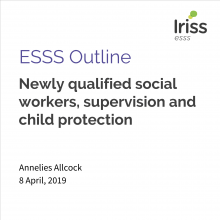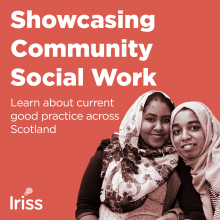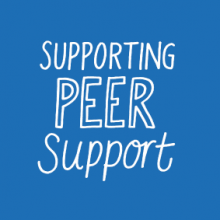Key points
- Peer support is not new and exists in many forms, from informal sharing of experiences, to formalised peer support roles (paid and unpaid) in services
- Through the development of formalised peer support roles, people with lived experience of mental health problems are trained and employed to support others
- An increasing number of organisations and services are developing peer support roles. There are now around 80 paid posts in mental health services and a far higher number of unpaid roles.
- There is potential for further growth in peer support roles across all types of mental health services
- Peer support roles are particularly effective in supporting issues identified as central to recovery, including hope, empowerment and social inclusion
- There is evidence of an increased focus on recovery; better awareness of the value of lived experience in services and relationships; and a reduction in stigma and a 'them and us' attitude through peer support
- Peer support roles help services implement goals set by wider policy, such as the co-production of services; and adopting a strengths, and rights-based, as well as a recovery-focused approach
Why focus on peer support roles?
Peer support is not new and exists in many forms, from the informal sharing of experiences, to formalised roles such as that of peer workers in mental health services. Narrative studies of recovery provide a wealth of evidence on the importance and value of support from others who have had similar experiences, and how it brings something different to that of professional support relationships (Brown and Kandirikirira, 2007). However, the design and delivery of many services is based on the relationship between the practitioner and person using the service and does not necessarily facilitate peer support. This means that people's valuable lived experience is not maximised.
The Scottish Government's Mental health strategy 2012–15 (Scottish Government, 2012), recognised the importance of peer support by including a commitment to review activity to date in Scotland, as a basis for learning and extending the use of the model. In a wider health and social care context, a series of policy documents have set out a vision of a more person-centred approach focused on wellbeing. Examples of these policies include the Commission on the future delivery of public services (Scottish Government, 2011), the 2020 vision for health and social care (Scottish Government, 2011 and 2013), the Healthcare quality strategy for NHS Scotland (Scottish Government, 2010) and the recent National clinical strategy for Scotland (Scottish Government, 2016). Peer support could play a significant role by contributing to a culture change which is more strengths-based and works to empower people to play a central role in any care and support they receive.
What do we mean by peer support roles?
Peer support is generally understood to be a relationship of mutual support where people with similar life experiences offer each other support, especially as they move through difficult or challenging experiences. The following definitions capture the essence of peer support in mental health services.
Peer support is an emotional support, frequently coupled with instrumental support, which is mutually offered or provided by persons having a mental health condition to others sharing a similar mental health condition to bring about a desired social or personal change (Gartner and Reissman, 1982)
... a system of giving and receiving help founded on the key principles of respect, shared responsibility, and a mutual agreement of what is helpful (Mead, Hilton and Curtis, 2001)
Peer support suggests that people with lived experience of mental health issues are seen as part of the solution with a role to play in supporting both their own recovery and the recovery of other people.
Over the last 10 years, peer working has been an emerging role in mental health services in Scotland with a number of early posts being created through a Scottish Government pilot scheme in five health board areas (Scottish Government, 2006). An increasing number of services are developing formalised peer support roles, both paid and voluntary, which complement and add value to their existing activities. Peer support is not intended to be a replacement for existing services or professional roles, but is designed to complement them (Bradstreet, 2006).
Peer workers are people with personal experience of mental health problems who are trained and employed to work in a formalised role in support of others in recovery. The peer worker role involves developing mutually empowering relationships; sharing experiences in a way that inspires hope; and offering hope and support as an equal (Scottish Recovery Network, 2012).
To support the development and improve understanding of peer support working, a values framework setting out the core values was produced (Scottish Recovery Network, 2012). This emphasised that the peer support role is based on the sharing of experiences and the development of relationships founded on hope, mutuality and empowerment.
It's not walking in front leading or from behind pushing — it's walking alongside (Scottish Recovery Network, 2013).
Peer support is a strengths-based approach which starts with what's strong, not with what's wrong; recognising the individual as a whole person rather than only focusing on the problem. This creates a relationship which is forward looking and solution focused, and one which generates hope, all the time promoting resilience and a strengthened ability to cope with difficulty.
What do peer support roles look like in services?
Some peer supporters work in dedicated teams taking referrals from other services and practitioners. Others work alongside practitioners performing a particular role in the team. The roles and activities of peer supporters in services vary, depending on their particular setting. These include:
- Working one-to-one with people
- Supporting people through transitions such as from hospital to home; and from secondary mental health services to community based supports and into employment
- Being part of social prescribing or community links-type initiatives that help people to access local opportunities and activities they feel will improve their wellbeing
- Facilitating recovery education, mutual support and self-help groups
- Supporting people to use self-management tools including Wellness Recovery Action Plans (WRAP)
Many of those in peer support roles are involved in more than one of the activities above. A combination of work with individuals and in groups is becoming more prevalent.
There has been a growth in both paid and unpaid peer support roles across Scotland in the 10 years since the first paid roles were piloted, as a result of the Delivering for mental health strategy (Scottish Government, 2006). There are now around 80 paid peer support roles in mental health services across Scotland and a far higher number of voluntary peer support roles. The majority, paid and unpaid, are in the voluntary sector with peer support roles being developed in a wide range of organisations, including national and local service providers; employability services; and lived experience-led organisations (Scottish Recovery Network, 2016). Development of roles in the statutory sector have been slower than had been hoped or anticipated, despite a long-term policy commitment to recovery approaches. Evidence suggests that there are a number of reasons for this patchy growth including a demand for better evidence of the cost-benefits of peer support roles, but also the reality of competing priorities where the development of peer support roles is seen as desired but not required (Gordon, 2015; Gordon and Bradstreet, 2015).
What is the evidence for peer support roles?
There is evidence that the development of formalised peer support roles has benefits for all involved: the people supported, the peer supporters, and the organisations or services with peer support roles. What emerges from the research is that peer support roles are particularly effective, when compared to non-peer roles, in delivering on a number of elements that have been identified as central to recovery including hope, empowerment, self-management and social inclusion (Repper and Carter, 2011).
In a thorough review of research in relation to all aspects of peer working, Repper and Carter (2011) identified a wide range of positive impacts of peer provided support. These findings are summarised below:
Hope
The benefit gained and inspiration provided in the peer-to-peer relationship is hard to overstate.
I feel that I show that there is hope for everyone, people can and do recover, going on to lead full and productive lives (Scottish Recovery Network, 2013)
Empowerment
Peer workers tend to realise specific improvements in feelings of empowerment, self-esteem and confidence in people (Davidson and colleagues, 2012). Feelings of empowerment were generally attributed to the new way of relating in peer-to-peer relationships, which is focused on mutuality, empathy and hope (McLean and colleagues, 2009).
Social support and functioning
In many studies, people receiving peer support showed improved community integration and social functioning. People using peer provided services are more likely to be involved in community activity and have better social networks than those without peer support. Where those engaging with mental health services also have substance misuse problems, there is evidence to suggest that the presence of peer support workers can result in the reduction of alcohol and drug use (Davidson and colleagues, 2012). In addition, when people are in frequent contact with peer supporters their stability in employment, training and education has been shown to increase.
Empathy and acceptance
Studies of peer support services highlight that they are more relational focused as opposed to task focused as is experienced with non-peer services. We know that people experiencing mental health problems who use services highly value the relationship with practitioners. This has resulted in evidence of greater feelings of acceptance and understanding for people receiving peer provided services.
Reducing stigma
People receiving peer support services are less likely to identify stigma as an obstacle to recovery and better quality of life.
Use of in-patient services
Studies of a number of peer provided services show evidence of reduced hospital admission and readmission rates. Those discharged from hospital with peer support may also make a more successful transition to home and community than those having a traditional discharge. A Centre for Mental Health report (Trachtenberg and colleagues, 2013), found that the presence of peer support workers could decrease inpatient bed use by reducing admissions or by shortening the stay in hospital. Indeed, they found that the cost savings in inpatient bed use was higher than the costs of employing peer support workers; in some cases these savings were substantial.
Many people commented that they now leave with a plan to be well by using the self-management techniques that are worked on with them (Scottish Recovery Network, 2013).
A recent Cochrane review (Pitt and colleagues, 2013) of the effectiveness of peer support roles in mental health services concluded that 'employing past or present consumers of mental health services as providers of mental health services achieves psychosocial, mental health symptom and service use outcomes that are no better or worse than those achieved by professional staff in providing care'. They did, however, suggest that future research into the effectiveness of peer support roles be less focused on clinical outcomes and more closely aligned to intended recovery outcomes.
As well as providing clear benefits for people engaging with services, a peer support approach also brings significant benefits for people employed as peer supporters. For those in paid posts, peer provided services offer employment opportunities where disclosure is positively encouraged (Mowbray and colleagues, 1998). For all peer supporters (paid and unpaid), being employed in a role where a person's experience of mental health is seen as an asset rather than a problem helps create a positive sense of identity. Becoming a peer supporter can also enhance a person's own recovery. Being able to use their lived experience to help others and having a valued and contributing role increases self-esteem and can give people meaning and purpose to their life (Repper and colleagues, 2013a).
A number of studies have looked beyond the impact on individuals and have also identified benefits for the services and systems implementing peer support roles. Developing and implementing peer support roles often results in an increased focus on, and understanding of, recovery among practitioners and managers. It also results in more awareness of the value of lived experience in service settings and relationships (Davidson and colleagues, 2012; McLean and colleagues, 2009). The presence of people with lived experience in staff teams has also challenged stigma and resulted in a reduction in 'them and us' attitudes (Pollitt and colleagues, 2012; Repper and Watson, 2012). Developing and implementing peer support roles can lead to services rethinking the way they support staff. This results in improvements which benefit not only the peer support workers, but all staff (Perkins, Rinaldi and Hardisty, 2010).
What does this mean for services?
As outlined earlier, the development of peer support roles can assist organisations and services to embrace the goals set by wider policy. The development of peer support roles provides a way for services to:
- Involve people in the design and delivery of services by providing opportunities, paid and unpaid, for people to be trained to use their lived experience to support others in recovery (co-production)
- Change the way services relate to those who use them by adopting an approach which explicitly values lived experience and is strengths based and recovery focused
- Provide a wider range of responses to people experiencing mental health problems
- Demonstrate that recovery is possible and that people can manage their well-being and live a fulfilling and meaningful life
Recovery-focused services (indeed all good quality services) are about involving people and using all available expertise, including lived experience, to ensure the support available leads to the best possible experiences and outcomes. In developing services which are more person-centred and demonstrate our commitment to human rights, much of our attention has been on the relationship between the practitioner and the person using services, particularly how they can be more involved in their care and support.
The development and implementation of peer support roles provides us with an opportunity to develop services which explicitly recognise lived experience as an asset; promote and support recovery; and are based on equal and empowering relationships. In addition, if this approach is embraced across services it has the potential to pay a significant role in changing the culture of our health and social care services to one which is strengths based, person centred and supports shared decision making.
The development of peer support roles is new for many services. This is an innovative and distinctive role which complements existing roles in mental health services, but can also challenge some of the assumptions made about the nature of the relationship between practitioner and person using the service. While there is an increasing body of evidence around the benefits of peer support roles in services, some studies have acknowledged that there have been challenges introducing them into mental health service teams. These challenges include establishing appropriate boundaries, and managing power imbalances in teams, which can result in peer workers experiencing stress, and the actual, or potential for, dilution of the role (Gilliard and colleagues, 2013). As it is a new role, in some cases it has lacked definition and this has been compounded by peer support workers having to integrate into teams where practice is not necessarily recovery focused (Bradstreet and Pratt, 2010).
As such, the development of peer support functions needs to be fully thought through to ensure that the role people play is clear and that they are welcomed and valued by existing practitioners and services. Services developing peer support roles are also interested in ensuring that there is appropriate training available and that they, and the people taking on the peer support roles, have access to ongoing guidance and support.
There is a small but increasing body of guidance and support for services developing peer worker roles. In Scotland, this function has been performed by Scottish Recovery Network, which has been promoting and supporting the development of peer support roles for almost 10 years. It has worked with people with lived experience of mental health problems and services to develop and implement peer support roles; to increase understanding of and improve peer support practice; and to promote the role of peer support in recovery focused services. This includes:
- Experts by experience — a guide to support the development and implementation of peer support roles in the mental health sector (Scottish Recovery Network, 2011)
- Values framework for peer working — a framework of values developed with peer workers to increase understanding of the role and maintain its distinctiveness (Scottish Recovery Network, 2012)
- Professional Development Award (PDA) in Mental Health Peer Support — a qualification developed in partnership with SQA to train current and future peer support workers
- Peer2Peer — a free training resource developed as a result of a European Project to develop and pilot a vocational course to prepare people with lived experience to be employed in peer support roles
Scottish Recovery Network also facilitates a Peer Learning Network which shares learning and practice and provides tailored advice, guidance and support to organisations seeking to develop peer working roles.
Other examples of guidance, support and training are provided by the ImROC programme (Implementing Recovery through Organisational Change), commissioned by the Department of Health, which has worked with 29 NHS mental health service providers and their partners. ImROC has produced resources on a number of recovery topics, including peer support roles (Repper and colleagues, 2013b).
International guidelines and training focused on peer support practice have been produced in Canada (Mental Health Commission of Canada, 2013); USA (Kaufman and colleagues, 2012) and Australia (Centre for Excellence in Peer Support, 2013).
While there are challenges in establishing peer support roles, there are considerable benefits of peer working in mental health and other services. These benefits not only include better experiences and outcomes of people using services, but also the ways in which introducing this role can assist services to become more recovery focused, strengths or asset based, and person centred.
References
- Bradstreet S and Pratt R (2010) Developing peer support worker roles: reflecting on experiences in Scotland, Mental Health and Social Inclusion, 14(3), 36–41
- Bradstreet S (2006) Harnessing the “Lived Experience”: Formalising peer support approaches to promote recovery, Mental Health Review Journal, 11(2), 33–37
- Brown W and Kandirikiriria N (2007) Recovering mental health in Scotland. Report on narrative investigation of mental health recovery (PDF), Glasgow: Scottish Recovery Network
- Centre for Excellence in Peer Support (2013) Considerations when setting up a peer support service, Mind Australia CEPS Setting up a Peer Support Service
- Davidson L et al (2012) Peer support among persons with severe mental illnesses: A review of evidence and experience, World Psychiatry, 11, 123-128
- Gartner A and Riessman F (1982) Self-help and mental health, Hospital and Community Psychiatry, 33, 631-635
- Gillard S et al (2013) Introducing peer worker roles into UK mental health service teams: A qualitative analysis of the organisational benefits and challenges, BMC Health Services Research, 13, 188
- GordonJ (2015) What are decision makers' barriers, facilitators and evidence needs regarding peer support working? (PDF), Glasgow: Scottish Recovery Network
- Gordon J and Bradstreet S (2015) So if we like the idea of peer workers, why aren't we seeing more?, World Journal of Psychiatry, 5(2), 160–166
- Kaufman L, Brooks W, Bellinger J et al (2012) Peer specialist training and certification programs: A national overview (PDF), University of Texas at Austin Center for Social Research
- Mead S, Hilton D and Curtis L (2001) Peer support: A theoretical perspective, Psychiatric Rehabilitation Journal, 25(2), 131-141
- Mental Health Commission of Canada (2013) Guidelines for the practice and training of peer support (PDF)
- McLean J, Biggs H, WhiteheadI et al (2009) Evaluation of the delivering for mental health peer support worker pilot scheme (PDF), Scottish Government Social Research
- Mowbray C, Moxley D and Collins M (1998) Consumer as mental health service providers: First person accounts of benefits and limitations, The Journal of Behavioural Health Sciences and Research, 25(4), 397-411
- Peer2peer Vocational Training Course (2015). Available at Training Materials
- Perkins R, Rinaldi M and Hardisty J (2010) Harnessing the expertise of experience: increasing access to employment within mental health services for people who have themselves experienced mental health problems, Diversity in Health and Care, 7, 13-21
- Pitt V, Lowe D, Hill S et al (2013) Consumer-providers of care for adult clients of statutory mental health services, Cochrane Database of Systematic Reviews, (3) CD004807
- Pollitt A, Winpenny E, Newbould J et al (2012) Evaluation of the peer worker programme of Cambridge and Peterborough NHS Foundation Trust (PDF), Rand Europe
- Repper J with contributions from Aldridge B, Gilfoyle S, Gillard S et al (2013a) Peer support workers: Theory and practice (PDF), ImROC briefing, Centre for Mental Heath and Mental Health Network, NHS Confederation
- Repper J with contributions from Aldridge B, Gilfoyle S, Gillard S et al (2013b) Peer support workers: A practical guide to implementation (PDF), IMROC Briefing, Centre for Mental Health and Mental Health Network, NHS Confederation
- Repper J and Watson E (2012) A year of peer support in Nottingham: Lessons learned, The Journal of Mental Health Training, Education and Practice, 7(2), 70-78
- Repper J and Carter T (2011) A review of the literature on peer support in mental health services, Journal of Mental Health, 20(4), 392-411
- Scottish Government (2016) A national clinical strategy for Scotland
- Scottish Government (2015) National health and wellbeing outcomes. A framework for improving the planning and delivery of integrated health and social care services (PDF)
- Scottish Government (2014) Public Bodies (Joint Working) (Scotland) Act (PDF)
- Scottish Government (2013) Route map to the 2020 vision for health and social care (PDF)
- Scottish Government (2012) Mental health strategy for Scotland (PDF)
- Scottish Government and NHSScotland (September 2011) Achieving sustainable quality in Scotland's healthcare. A '20:20' vision strategic narrative
- Scottish Government (June 2011) Commission on the future delivery of public services (PDF)
- Scottish Government (May 2010) The healthcare quality strategy for NHS Scotland (PDF)
- Scottish Government (2006) Delivering for mental health
- Scottish Recovery Network (2013) Reviewing peer working: A new way of working in mental health (PDF)
- Scottish Recovery Network in partnership with Peer Learning Network (2012) Experts by experience: Values framework for peer working (PDF)
- Scottish Recovery Network (2011) Experts by experience: Guidelines to support the development of peer worker roles in the mental health sector (PDF)
- Scottish Recovery Network (2016, unpublished) Supporting empowerment through self-help and mutual support.
- Trachtenberg M, Parsonage M, Shepherd G et al (2013) Peer support in mental health care: Is it good value for money? Centre for Mental Health (PDF)
Acknowledgements
This Insight was reviewed by Neil Macleod (Scottish Social Services Council), Ashley Young (Simon Community Scotland) and colleagues from the Scottish Government. Comments represent the views of reviewers and do not necessarily represent those of their organisations. Iriss would like to thank the reviewers for taking the time to reflect and comment on this Insight.




